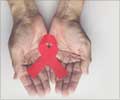Official statistics indicate that almost 40 million people worldwide live with HIV/AIDS.

Individuals in the trial that made antibodies that bound to a specific region of the HIV envelope protein had a decreased risk of HIV infection. A new study in the Journal of Clinical Investigation reveals that an individual's genotype correlates with their ability to develop immunity to HIV in response to vaccination. Sue Li and colleagues at the Fred Hutchinson Cancer Research Center sequenced genes in RV144 participants that are involved in antibody production. The authors identified single nucleotide variations in genes that encode antibody receptors, which are important for protective immunity. They found that the majority of individuals with specific variants of the FCGR2C gene were protected from HIV infection after vaccination whereas a different form of FCGR2C was not associated with protection. Their study provides important insight into the variable response of individuals in the RV144 trial.
Source-Eurekalert
 MEDINDIA
MEDINDIA




 Email
Email









